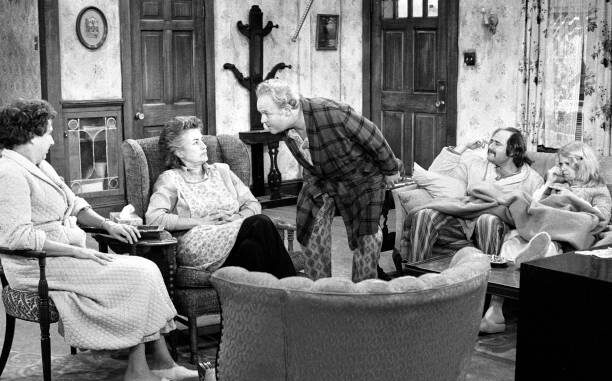
When All in the Family premiered in 1971, it introduced viewers to one of television’s most iconic characters: Archie Bunker. Played masterfully by Carroll O’Connor, Archie was a working-class man whose loud opinions and outdated views sparked laughter and conversation. His character not only became a household name but also forever transformed the landscape of American sitcoms. Let’s explore how Archie Bunker changed the sitcom genre and why his legacy endures.
1. Breaking the Mold of the Sitcom Hero
A Flawed Protagonist
Prior to Archie, sitcoms often featured idealized characters who embodied virtues like kindness and intelligence. Archie Bunker flipped this notion on its head. He was brash, bigoted, and often downright unlikable, yet his character was relatable to many viewers. This shift toward a more flawed protagonist opened the door for complex character development in future sitcoms.
Realistic Portrayal of Middle-Class Life
Archie represented the average American, complete with struggles, biases, and imperfections. His portrayal of middle-class life resonated with audiences, making them feel seen and understood in ways that previous sitcoms had not.
2. Tackling Social Issues Head-On
Addressing Controversial Topics
One of the hallmarks of All in the Family was its willingness to address hot-button issues like racism, sexism, and politics. Through Archie’s often outdated views, the show sparked conversations about societal norms and prejudices. This direct approach to controversial topics set a precedent for future sitcoms to tackle serious issues while still delivering humor.
The Role of Humor in Discourse
Archie’s character allowed for uncomfortable discussions to occur within a comedic framework. His outrageous statements often prompted counterarguments from other characters, creating a dialogue that encouraged viewers to reflect on their own beliefs. This blend of humor and social commentary became a blueprint for many successful sitcoms that followed.
3. The Evolution of Character Complexity
Growth Through Conflict
Archie Bunker wasn’t static; his character evolved throughout the series. As the show progressed, he faced challenges that forced him to confront his prejudices and biases. This character development added depth to his persona, showcasing that even flawed individuals could grow and change.
Complex Family Dynamics
The interactions between Archie and his family members, particularly his wife Edith and son-in-law Mike, highlighted generational and ideological conflicts. These relationships explored themes of love, acceptance, and understanding, paving the way for more nuanced family dynamics in future sitcoms.
4. Influence on Future Sitcoms
A Template for Character-Driven Comedy
Archie Bunker’s legacy can be seen in many subsequent sitcoms. Shows like The Simpsons, Roseanne, and Family Guy all feature flawed, often outrageous characters who challenge societal norms and expectations. The willingness to portray controversial figures and situations became a defining characteristic of modern television comedy.
Diversity of Characters
As sitcoms began to embrace Archie’s model of complexity, they also started to diversify their characters. More shows began to include a range of voices and perspectives, reflecting the changing American landscape. Characters with differing backgrounds, beliefs, and experiences became integral to the fabric of sitcom storytelling.
5. Lasting Cultural Impact
Cultural Icon
Archie Bunker remains a cultural touchstone, representing not just the character himself but an entire era of television. His catchphrases and antics are still referenced today, illustrating the lasting impact he has had on popular culture.
Continued Relevance
The issues Archie grappled with—racism, gender roles, and economic struggles—are still relevant today. His character continues to serve as a lens through which we can examine societal changes and ongoing challenges, making him a timeless figure in American television.
Conclusion
Archie Bunker changed the American sitcom forever by introducing a flawed, complex character who challenged social norms and sparked important conversations. His legacy lives on in the characters and narratives that continue to push boundaries and reflect the diverse experiences of American life. Through laughter and reflection, Archie’s influence remains a significant part of television history.
FAQs
1. What made Archie Bunker a groundbreaking character?
Archie was a flawed protagonist who addressed social issues head-on, making him relatable and complex, unlike previous sitcom heroes.
2. How did All in the Family address controversial topics?
The show used humor to tackle serious issues like racism and sexism, encouraging viewers to engage in dialogue about societal norms.
3. What influence did Archie Bunker have on later sitcoms?
His character set a precedent for flawed characters in sitcoms, leading to more complex storytelling and diverse characters in future shows.
4. How did Archie’s character evolve throughout the series?
As the series progressed, Archie faced challenges that prompted him to confront his biases, showcasing growth and complexity.
5. Why does Archie Bunker remain a cultural icon?
Archie’s catchphrases and issues he confronted continue to resonate, reflecting ongoing societal challenges and making him a timeless figure in television.
